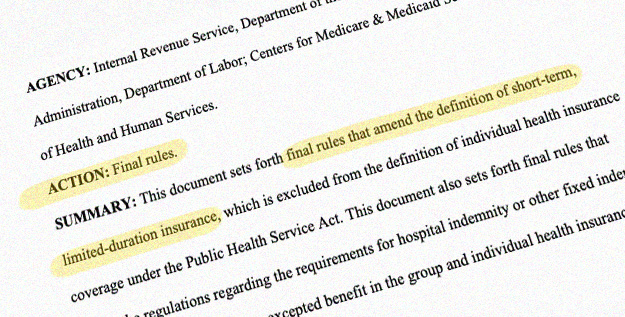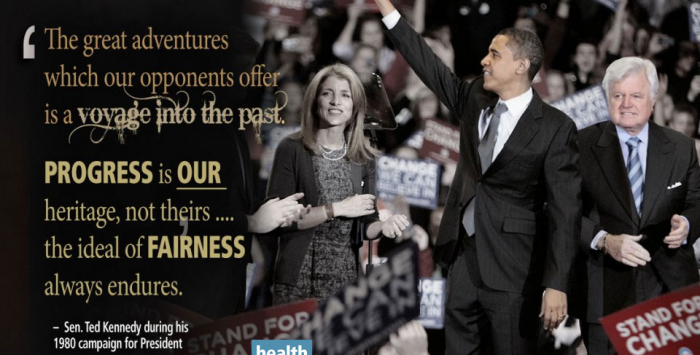Note to readers: I welcome reader comments and questions, and will try my best to reply in a timely manner. I ask only that you do your part to keep our discussion both reasoned and polite. – MM
Ted Kennedy’s speech at the 1980 Democratic convention still echoes in my mind. It remains the finest, most inspiring political oration that I have ever heard. Kennedy was speaking from a position of defeat. He had just lost the Democratic nomination to Jimmy Carter.
And yet this was a full-hearted, rousing speech delivered by a man who realized that in the battle ahead, the issues at stake were far, far more important than his own loss. Intuitively, he knew that the country had reached a turning point. (You can listen to the speech at The History Place.
At that moment, Conservatives were ready to launch a revolution, and they would succeed. In November, Ronald Reagan won the White House, and his administration would set the tone for much of the next 30 years. Tax cuts for the rich, deregulation, a campaign to privatize both Social Security and Medicare. Health care reform would be off the table for many years.
Kennedy saw the danger ahead and addressed it: “My fellow Democrats and my fellow Americans, I have come here tonight, asking you to renew the commitment of the Democratic Party to economic justice.”
Then, as now, unemployment was the most pressing issue of the day: “Let us pledge that employment will be the first priority of our economic policy,” Kennedy declared, “We will not compromise on the issue of jobs.”
Universal coverage – ‘the passion of my life’
Kennedy understood that “we cannot have a fair prosperity in isolation from a fair society. So,” he declared, “I will continue to stand for a national health insurance.”
“We must not surrender to the relentless medical inflation that can bankrupt almost anyone and that may soon break the budgets of government at every level. Let us insist on real control over what doctors and hospitals can charge, and let us resolve that the state of a family’s health shall never depend on the size of a family’s wealth.”
Kennedy had witnessed what economic inequality can mean when a child is sick. Many years later he recalled “One of the searing memories in my life was being in a children’s hospital in Boston, where my son had lost his leg to cancer. He was under a regime that was going to take three days of treatment, every three weeks, for two years …
“But for all the other families – they didn’t have the kind of health insurance I had. It was $3,000 for every family every three weeks. And I listened to these families whose children had the same kind of affliction as my child had. And they said, ‘Look, we’ve sold our house. We have the $30,000. We have $20,000. We are able to afford it for three months, for four months, for five months. What kind of chance does my child have to be able to survive?’
“I knew that my child was going to have the best because I had the health insurance of the United States Senate. And I knew that no one, no parent, no parent in that hospital had the kind of coverage that I had. That kind of choice, for any parent in this country is absolutely unacceptable and wrong, my friends.”
In that speech, he called universal coverage “the passion of my life.”
Kennedy would fight for health care reform on the floor of the U.S. Senate 15 separate times. The last time he stood up for healthcare, the 76-year-old was battling a brain tumor.
Prosperity and equality
In 1980, the differences between Republicans and Democrats were stark, just as they are today. A recent Bloomberg poll reveals that two-thirds of the delegates surveyed before this week’s Democratic convention say insufficient tax revenue is the main cause of the long-term federal deficit, a view held by just 1 percent of Republicans. More than 9 of 10 Republicans pick entitlements such as Medicare and Social Security, as the biggest driver (of the deficit) compared to just 5 percent of Democratic delegates.
Thirty-years ago Kennedy said: “The Federal budget can be balanced only by policies that bring us to a balanced prosperity of full employment.” As for taxes, “the cuts that our Republican opponents” call for “takes the name of tax reform in vain. It is a wonderfully Republican idea that would redistribute income in the wrong direction.”
“The 1980 Republican convention was awash with crocodile tears for our economic distress,” he observed, “but it is by their long record and not their recent words that you shall know them.
“The same Republicans who are talking about the crisis of unemployment have nominated a man who once said, and I quote, ‘Unemployment insurance is a prepaid vacation plan for freeloaders.’ And that nominee is no friend of labor.
“The same Republicans who are talking about security for the elderly have nominated a man who said just four years ago that ‘Participation in social security should be made voluntary.’ And that nominee is no friend of the senior citizens of this Nation.
“The same Republicans who are talking about preserving the environment have nominated a man who last year made the preposterous statement, and I quote, ‘Eighty percent of our air pollution comes from plants and trees.’
“And that nominee is no friend of the environment.”
1980 and 2012: Once again, a watershed moment
Kennedy’s speech was passionately partisan – unabashedly partisan.
This is not President Obama’s style. As Massachusetts House Representative Barney Frank observed in 2009: “Obama tends to … underestimates the importance of confronting ideological differences.”
Yet “We are at a moment when liberalism is poised to have its biggest impact on America since Roosevelt because the conservative viewpoint has been so thoroughly repudiated by reality.”
I agree. The conservative crusade against government oversight, regulation and taxation that began with the Reagan administration found its apogee in the Bush administration. Keep in mind that the “apogee” of an orbit is that point furthest from Earth. Bush took conservative doctrine quite literally over the top – and the economic meltdown that followed was all but inevitable. Democrats should not blame Obama for the state of the economy today. No one could repair the damage in just four years.
Now, as in 1980, we have reached a turning point. The time has come to implement health care reform, rein in health care spending, and create jobs. This week, I fervently hope that President Obama will raise his voice, rouse his base and remember Kennedy’s words:
“The great adventures which our opponents offer is a voyage into the past. Progress is our heritage, not theirs. What is right for us as Democrats is also the right way for Democrats to win. The commitment I seek is not to outworn views but to old values that will never wear out. Programs may sometimes become obsolete, but the ideal of fairness always endures. Circumstances may change, but the work of compassion must continue.”








